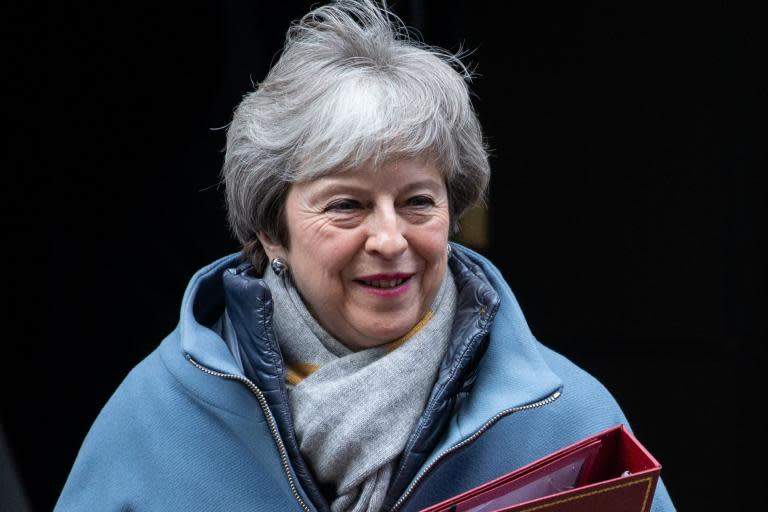Brexit: MPs and business leaders protest at May's identical ‘plan B’
Theresa May faced protests from MPs of all parties and from business leaders after unveiling a “plan B” Brexit plan virtually identical to the one that crashed to a record defeat last week.
The prime minister was accused of refusing to accept the reality of the crushing rejection of her plan, after vowing to again seek changes to the Irish border backstop – despite the EU repeatedly insisting it will not budge.
Business leaders also warned the statement was “another bleak day”, as it took the UK one step closer to the disaster of crashing out of the EU with no agreement on 29 March.
In the Commons, Jeremy Corbyn attacked “groundhog day”, while senior Tories warned it was “like last week’s vote never happened” and that the UK was being turned “into a laughing stock”.
The prime minister immediately faced a fresh threat with a demand she grants her ministers a free vote on a backbench move to thwart a no-deal Brexit, or face dozens of ministerial resignations.
The Independent was told that Amber Rudd, the work and pensions secretary, has made the call over parliament’s attempt, next week, to force the government to seek an extension to the Article 50 process.
Put forward by Labour’s Yvette Cooper, with support from ex-Tory ministers, it would give parliament the power to put forward its own bill, ordering the extension until the end of 2019, unless a deal is passed by the end of February.
The Tories have yet to announce whether they will whip their MPs against the Cooper plan – which is thought to be supported by large numbers of ministers determined to block a no-deal.
Labour also tabled its own amendment, confirming what Keir Starmer announced at the weekend – that its own Brexit plan and support for a Final Say referendum are the only remaining options.
In the chamber, Ms May claimed “three key changes” to her rejected deal – offering a greater say for parliament over future trade talks, stronger protections on workers’ rights and the environment, and movement on the backstop.
However, the first two were promised last week and, on the vexed issue of the backstop, she offered no new thinking on how to break the deadlock.
Her spokesman said afterwards that she would seek further changes on fears about its “permanence”, but did not pretend that the EU is about to be presented with fresh ideas.
Many think the prime minister’s plan is a vote, next week, allowing MPs to lay down their detailed objections to the backstop – which can then be presented to the EU as an ultimatum.
Instead, Ms May won some plaudits by announcing she was finally bowing to pressure to waive the £65 fee for EU citizens to apply to stay in the UK after Brexit. Those who have already applied will be reimbursed.
The prime minister also raised eyebrows with her strongest attack yet on those calling for a fresh Brexit referendum, warning it would “damage social cohesion”.
Her aides denied she was suggesting there would be violence if it went ahead, arguing she feared the “bond of trust”, or the “covenant” between politicians and voters would be broken.
On the backstop, Ms May said: “Despite the changes we have previously agreed, there remain two core issues: the fear that we could be trapped in it permanently; and concerns over its potential impact on our Union if Northern Ireland is treated differently from the rest of the UK.”
She would hold further talks with MPs – “including in the DUP” – on possible changes, adding: “I will then take the conclusions of those discussions back to the EU.”
Mr Corbyn protested that her pledge to seek a cross-party consensus had been “exposed as a PR sham”, telling her: “There was no flexibility; there were no negotiations; nothing had changed.”
“What makes her think that what she tried to renegotiate in December will succeed in January? This really does feel like Groundhog Day.”
Anna Soubry, a pro-EU Tory said: “I’m sorry but this just isn’t good enough... this whole process is now turning our country into a laughing stock.”
Her ally, Justine Greening, said the impasse strengthened the case for a Final Say referendum, saying: “We could debate for another two-and-a-half years and we still wouldn’t reach a resolution on Brexit.”
And Sarah Wollaston, a third Tory referendum supporter, said: “It’s like last week’s vote never happened. Plan B is Plan A.”
Business chiefs echoed the criticism, Carolyn Fairbairn, director general of the CBI, warning: “Parliament remains in deadlock while the slope to a cliff edge steepens.
“The government should accept that no-deal in March 2019 must be off the table. Politicians on both sides of the Commons need to step back from their increasingly entrenched positions.”
Helen Dickinson, chief executive of the British Retail Consortium, said: “We appear to be little closer to a solution, ready to be implemented before March 30, that ensures frictionless, tariff-free trade with the EU.”
Meanwhile, as The Independent reported was on the cards, the flagship trade bill suffered a House of Lords ambush that will shelve the legislation until ministers answer questions on food safety and public services.
Nick Dearden, from the campaign group Global Justice Now, said it was “absolutely delighted”, warning the bill “failed to give proper powers to parliament to scrutinise, debate and discuss Britain’s post-Brexit trade deals”.

 Yahoo News
Yahoo News 

